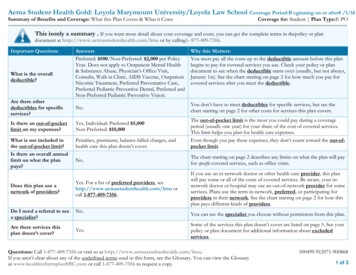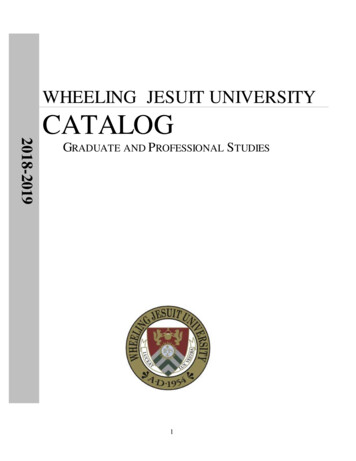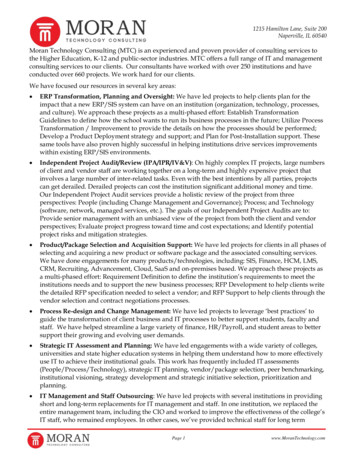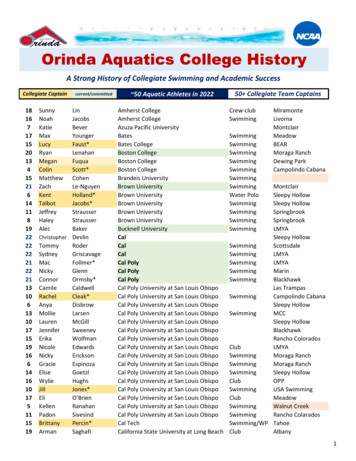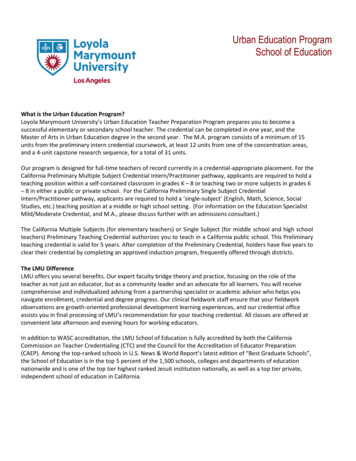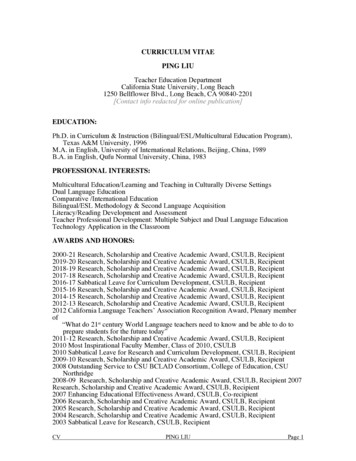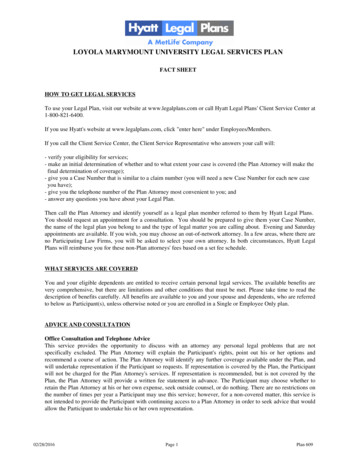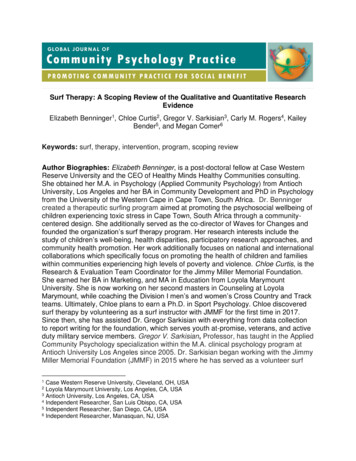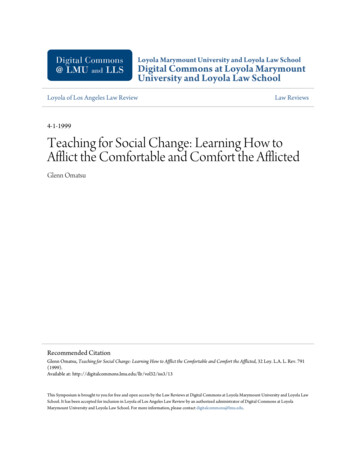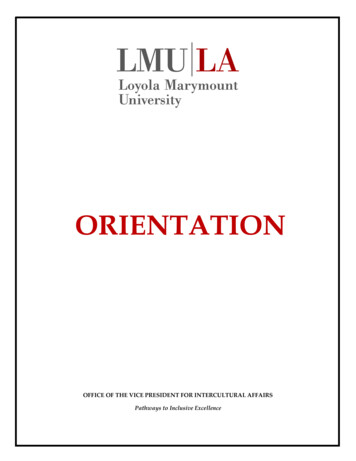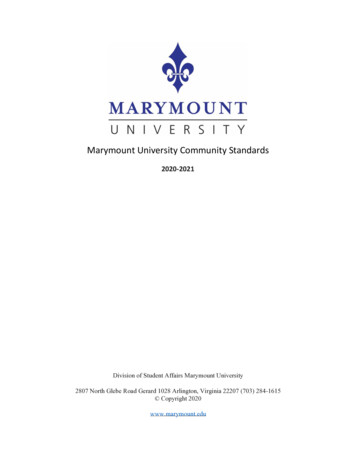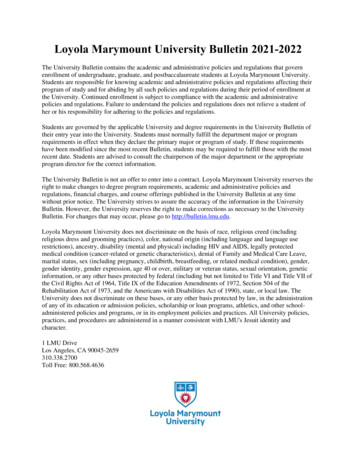
Transcription
Loyola Marymount University Bulletin 2021-2022The University Bulletin contains the academic and administrative policies and regulations that governenrollment of undergraduate, graduate, and postbaccalaureate students at Loyola Marymount University.Students are responsible for knowing academic and administrative policies and regulations affecting theirprogram of study and for abiding by all such policies and regulations during their period of enrollment atthe University. Continued enrollment is subject to compliance with the academic and administrativepolicies and regulations. Failure to understand the policies and regulations does not relieve a student ofher or his responsibility for adhering to the policies and regulations.Students are governed by the applicable University and degree requirements in the University Bulletin oftheir entry year into the University. Students must normally fulfill the department major or programrequirements in effect when they declare the primary major or program of study. If these requirementshave been modified since the most recent Bulletin, students may be required to fulfill those with the mostrecent date. Students are advised to consult the chairperson of the major department or the appropriateprogram director for the correct information.The University Bulletin is not an offer to enter into a contract. Loyola Marymount University reserves theright to make changes to degree program requirements, academic and administrative policies andregulations, financial charges, and course offerings published in the University Bulletin at any timewithout prior notice. The University strives to assure the accuracy of the information in the UniversityBulletin. However, the University reserves the right to make corrections as necessary to the UniversityBulletin. For changes that may occur, please go to http://bulletin.lmu.edu.Loyola Marymount University does not discriminate on the basis of race, religious creed (includingreligious dress and grooming practices), color, national origin (including language and language userestrictions), ancestry, disability (mental and physical) including HIV and AIDS, legally protectedmedical condition (cancer-related or genetic characteristics), denial of Family and Medical Care Leave,marital status, sex (including pregnancy, childbirth, breastfeeding, or related medical condition), gender,gender identity, gender expression, age 40 or over, military or veteran status, sexual orientation, geneticinformation, or any other bases protected by federal (including but not limited to Title VI and Title VII ofthe Civil Rights Act of 1964, Title IX of the Education Amendments of 1972, Section 504 of theRehabilitation Act of 1973, and the Americans with Disabilities Act of 1990), state, or local law. TheUniversity does not discriminate on these bases, or any other basis protected by law, in the administrationof any of its education or admission policies, scholarship or loan programs, athletics, and other schooladministered policies and programs, or in its employment policies and practices. All University policies,practices, and procedures are administered in a manner consistent with LMU's Jesuit identity andcharacter.1 LMU DriveLos Angeles, CA 90045-2659310.338.2700Toll Free: 800.568.46361
Table of ContentsThe University . 3Admission to the University 11Financial Aid . 24Tuition and Fees . 39Academic Degrees and Programs . 52Academic Degree Requirements and Policies 64University Core Curriculum . 101Academic Awards and Commencement Honors 105University Honors Program 116Bellarmine College of Liberal Arts 121College of Business Administration .321College of Communication and Fine Arts .412Frank R. Seaver College of Science and Engineering .504School of Education .687School of Film and Television .783Aerospace Studies 824Center for Undergraduate Teacher Preparation 826LMU Extension 841Graduate Division 843Academic Programs and Services 846University Administration and Faculty .856Course Descriptions .9272
The UniversityHistoryThe names "Loyola" and "Marymount" have long been associated with Catholic highereducation in countries around the globe. Saint Ignatius Loyola, founder of the Society of Jesus,the Jesuits, sanctioned the foundation of his order's first school in 1548. The Religious of theSacred Heart of Mary have conducted educational institutions since their establishment in Franceby Father Jean Gailhac. These two traditions of education have come together in Los Angeles asLoyola Marymount University.The present institution is the successor to the pioneer Catholic college and first institution ofhigher learning in Southern California. In 1865 the Vincentian Fathers inaugurated St. Vincent'sCollege for Boys in Los Angeles. When this school closed in 1911, members of the Society ofJesus opened the high school division in their newly founded Los Angeles College.Rapid growth prompted the Jesuits to commence the collegiate department that same year, seek anew campus in 1917, and incorporate as Loyola College of Los Angeles in 1918. Relocating tothe present Westchester campus in 1929, the school achieved university status one year later.Graduate instruction began in 1920 with the foundation of a separate law school. The formationof the Graduate Division occurred in June 1950, though graduate work had formed an integralpart of the Teacher Education Program during the preceding two years.The Religious of the Sacred Heart of Mary began teaching local young women in 1923. Tenyears later they opened Marymount Junior College in Westwood which first granted thebaccalaureate degree in 1948. The school later transferred classes to a new campus on the PalosVerdes Peninsula in 1960. Eight years later, Marymount College moved again, this time to theWestchester campus of Loyola University as an autonomous college. At this juncture, the Sistersof St. Joseph of Orange joined the Marymount Sisters as partners.After five years of sharing faculties and facilities, Loyola University and Marymount Collegemerged and formed Loyola Marymount University in July 1973. Through this union, theexpanded school maintained the century-old mission of Catholic higher education in LosAngeles.In articulating a vision for this unique collegiate enterprise, the Board of Trustees turned to thehistory of the four-century-old Jesuit educational philosophy as well as to the history andtraditions of the Marymount and St. Joseph's Sisters. They also recognized the riches of a varietyof religious traditions represented among the dedicated faculty and staff that complemented andenhanced the school's heritage of Catholic values.3
The University pursues quality in: Curricula of All Academic ProgramsCo-curricular Programs and Support ServicesFaculty, Administration and StaffStudentsCampus Life, Hospitality and ServicesLoyola Marymount University: Promotes Academic ExcellenceLives an Institutional Commitment to Roman Catholicism and the Judeo-ChristianTraditionProvides a Liberal EducationFosters a Student-centered UniversityCreates a Sense of Community on CampusParticipates Actively in the Life of the Larger CommunityUniversity Mission StatementIntroductionLoyola Marymount University offers rigorous undergraduate, graduate, and professionalprograms to academically ambitious students committed to lives of meaning and purpose. Webenefit from our location in Los Angeles, a dynamic city that brings into sharp focus the issuesof our time and provides an ideal context for study, research, creative work, and activeengagement. By intention and philosophy, we invite men and women diverse in talents, interests,and cultural backgrounds to enrich our educational community and advance our mission: The encouragement of learningThe education of the whole personThe service of faith and the promotion of justiceThe University is institutionally committed to Roman Catholicism and takes its fundamentalinspiration from the combined heritage of the Jesuits, the Marymount Sisters, and the Sisters ofSt. Joseph of Orange. This Catholic identity and religious heritage distinguish LMU from otheruniversities and provide touchstones for understanding our threefold mission.The Encouragement of LearningAt LMU, the encouragement of learning takes place in the context of an intellectual traditionthat: Insists on critical thinking and the development of imagination and artistic expressionTakes philosophical and theological disciplines seriouslyEngages in ethical discourse and embraces the search for values4
Respects the integrity of the individual while at the same time pursuing the common goodViews the world as sacramental and seeks to find God in all thingsEncourages an integration of knowledge in which "faith and reason bear witness to theunity of all truth" (Ex Corde Ecclesiae, 1990, #17)As a foundation for inquiry and learning, we strive to create an intercultural community and topromote ecumenical and inter-religious dialogue. This means that at LMU the encouragement oflearning is a radical commitment to free and honest inquiry--but always with reverence beforethe mystery of the universe and openness to transcendent reality.The Education of the Whole PersonWith roots in the spiritual humanism of the earliest Jesuit colleges, LMU's pedagogical traditionhas an abiding concern for the education of the whole person. Today we understand this as asimultaneous process of information, formation, and transformation. The education of the wholeperson thus includes these points: It encourages personal integration of the student's thinking, feeling, choosing, evolvingself. It does this by fostering not only academic and professional development but alsophysical, social, psychological, moral, cultural, and religious/spiritual growth.It promotes formation of character and values, meaning and purpose. As students learn to"read" what is going on in their own lives and in the larger world, they are encouraged togrow in the skills of personal and social literacy needed for responsible citizenship.It seeks to develop men and women for others. LMU encourages students, faculty, andstaff to identify with those living on the margins of society so that the intellectual inquiryand moral reflection endemic to university life will lead to meaningful work fortransformative social change.The Service of Faith and the Promotion of JusticeWe take seriously both parts of this phrase. The service of faith encompasses all those ways inwhich the University engages its Catholic intellectual, cultural, and religious heritage. Theseways include specific courses and academic programs as well as opportunities for worship, faithformation, and spiritual development.The service of faith also honors the reality of religious pluralism on our campus and embracesinter-faith dialogue in formal and informal contexts. The desired outcome of such encountersmoves us beyond tolerance to mutual respect and understanding, deepens appreciation of one'sown faith, and creates opportunities for engaging others who share a longing for meaningfullives.Finally, at LMU we insist that the service of faith is incomplete without the promotion of justice.Together with the University's sponsoring religious orders and the post-Vatican II Church, webelieve that participating in the struggle for justice in ways appropriate to our academiccommunity is a requirement--not simply an option--of biblical faith. In this struggle LMU makes5
common cause with all who share a commitment to local and global justice, whether they aremotivated by faith or other noble ideals.Updated May 2010GoalsLoyola Marymount University promotes academic excellence by: Enrolling an academically ambitious, multicultural, and socioeconomically diversestudent bodyRecruiting, retaining, and supporting a diverse and multicultural faculty committed toexcellence in teaching and active scholarship or artistic productivitySustaining an excellent staff and administration as partners with the faculty in promotingacademic excellenceEngaging students in academic programs that explore the multicultural experience ofAmerican ethnic groupsMaintaining an academic community in which freedom of inquiry and expression enjoythe highest priorityEmphasizing the skills and knowledge necessary for a lifetime of intellectual growth andproviding strong pre-professional and professional preparation in the undergraduatecurriculumOffering excellent graduate and legal education in a context which promotes the higheststandards of personal integrity and professional responsibilityDeveloping and maintaining the physical facilities, equipment, and support systems thatenable the university to carry out its academic missionProviding library facilities and services for excellence in the university's undergraduate,graduate, and professional programsLives an institutional commitment to Catholicism and the Judeo-Christian tradition by: Ensuring that Catholic faith and tradition continue to inform and inspire the LoyolaMarymount educational experienceEncouraging collaboration between members of the founding religious communities andother members of the University to give a distinctive tone to campus lifeWelcoming students, faculty, and staff from all faith traditionsEmphasizing the examination of the moral and ethical implications of all human actionsFostering a just society through a commitment to social justice and serviceOffering opportunities for religious practice and faith development for the entire LoyolaMarymount communityProvides a liberal education by: Offering a core curriculum that provides each undergraduate with a broad education inthe liberal arts and sciences as the heart of the undergraduate experienceEmphasizing the study of philosophy and theology in the undergraduate curriculum6
Challenging all students to think critically and reflect on basic values and issues, and freethemselves from prejudiceSupporting a faculty committed to excellent teaching and scholarship in a universitybased on the liberal arts traditionEncouraging students to understand their fields of studies in a broad intellectual, ethical,and social contextPreparing students, undergraduate and graduate, to play active roles in addressing theproblems and challenges of the larger society and world in which they liveFosters a student-centered university by: Maintaining the residential character and medium size of the Westchester campus toassure that each student receives personal attentionEncouraging staff, administration, and faculty to embrace the ideal of personal care anddedication to the well-being and development of each studentOffering co-curricular programs that complement the academic programs and produce acoherent educational experienceSupporting the full involvement of students in campus life by offering a wide variety ofactivitiesProviding opportunities for students to develop their leadership skills by activelyinvolving them in decision makingChallenging and encouraging students to lead and serve othersCreates a sense of community on campus by: Introducing new members of the community to the shared values and history of theuniversity and reinforcing a sense of belonging for all membersAssuring that the daily life of the campus reflects a vision of human dignity and fostersmutual understanding and caringCelebrating the richness and diversity of a multicultural campusEncouraging faculty, staff, administrators, and students to serve others, participate in thelife of the University, and act as responsible and generous members of the academiccommunityProviding opportunities to participate in making significant decisions through welldefined and fair proceduresParticipates actively in the life of the larger community by: Using the resources of Los Angeles and Southern California to expand and deepen thestudent's educational experienceDeveloping academic programs that address the dynamics and opportunities of thenations and cultures of Latin America and the Pacific RimInspiring faculty, staff, students, and alumni to serve their communities and society byapplying their skills and knowledge to critical problemsContributing to the intellectual and cultural life of society through scholarship and thearts7
Providing leadership in the examination and discussion of the ethical dimensions ofsocial issuesRecognizing a particular responsibility to serve the global Church, and especially thepeople of the Archdiocese of Los Angeles and the local dioceses.Approved by Board of Trustees, December 3, 1990InterculturalismInterculturalism is sharing and learning across cultures with the aim of promoting understanding,equity, harmony, and justice in a diverse society. Our actions must be grounded in, and guidedby, the following: LMU is composed of individuals and groups who continue to grow in knowledge of thehistorical contexts from which we emerged.Knowledge of self and others, inspired by a commitment to human dignity and justice, isthe hallmark of interculturalism.Promotion of the common good requires the recognition of similarities within a commonhumanity, the appreciation of differences, and the willingness to share cross-culturalexperiences.Interculturalism is a dynamic and critical endeavor that involves the acquisition ofknowledge, ongoing examination of the way we view the world, and purposeful action topromote a just and harmonious society at LMU and beyond.VisionGrounded in the Catholic intellectual tradition, Loyola Marymount University affirms humandignity and promotes justice. Different cultures are unique expressions of these commonaspirations.All cultures can contribute to the search for knowledge and the building of communities basedon the common humanity of all people. At LMU, interculturalism is an essential source ofacademic excellence and a defining characteristic of our campus community. We draw uponinterculturalism to create a university of excellence, to serve as a model Catholic institution, andto be a catalyst for the creation of a more just society built on respect and a sense of shareddestiny.We embody interculturalism in our policies, practices, and curricula. We promote personal andprofessional interaction, encouraging intercultural engagement to engender trust, respect, andcompassion. Intercultural engagement enables us to share power and responsibility as we grow inself-knowledge, learn to value the unique qualities of diverse cultural groups, and understand thecommon elements of our shared humanity.Accreditation8
Accreditation--a seal of approval by professional peers--indicates that an institution or programmeets the quality standards of the group conferring the accreditation.Loyola Marymount University is both regionally and professionally accredited by the followingorganizations:Regional/General Accreditations Western Association of Schools and Colleges (WASC)*Program-Specific Accreditation Accreditation Association for Ambulatory Health CareAmerican Art Therapy AssociationAmerican Bar AssociationAssociation of American Law SchoolsAssociation to Advance Collegiate Schools of BusinessCalifornia State Commission on Teacher CredentialingCommittee of Bar Examiners of the State Bar of CaliforniaThe Engineering Accreditation Commission of the Accreditation Board for Engineeringand TechnologyCouncil for the Accreditation of Educator PreparationInternational Association of Counseling ServicesNational Association of Schools of Art and Design Commission of AccreditationNational Association of Schools of DanceNational Association of Schools of MusicNational Association of Schools of TheatreNational Association of School PsychologyNational Council for Accreditation of Teacher Education*WASC is reviewed periodically and recognized by the U.S. Department of Education (USDOE)and the Council for Higher Education Accreditation (CHEA).MembershipLoyola Marymount University is a member of the following organizations: American Academy in RomeAmerican Association of Colleges for Teacher EducationAmerican Association of Collegiate Registrars and Admissions OfficersAmerican Chemical SocietyAmerican College Personnel AssociationAmerican College of PhysiciansAmerican Council on EducationAmerican Counseling AssociationAmerican Mathematical Society9
American Schools of Oriental ResearchAmerican Society for Engineering EducationAmerican Volleyball Coaches AssociationAssociation of American CollegesAssociation of College and University Housing Officers--InternationalAssociation of Fraternity AdvisorsAssociation of Graduate Schools in Catholic Colleges and UniversitiesAssociation of International EducatorsAssociation of Jesuit Colleges and UniversitiesAssociation of University and College Counseling Center DirectorsAssociation to Advance Collegiate Schools of BusinessBlack Coaches AssociationCalifornia Association of Counseling and DevelopmentCalifornia Career Development AssociationCalifornia Council on the Education of TeachersCalifornia Educational Placement AssociationCalifornia Women in Higher EducationCollege Entrance Examination BoardConference of the Registrars in Jesuit InstitutionsConsortium of Liberal Arts Small Independent CollegesCouncil of Graduate Schools in the United StatesJesuit Association of Student Personnel AdministratorsLos Angeles Chamber of CommerceNational Association of Advisors for the Health ProfessionsNational Association of Campus ActivitiesNational Association of College Directors of AthleticsNational Association of Colleges and EmployersNational Association of Graduate Admissions ProfessionalsNational Association of Schools of Art and DesignNational Association of Schools of DanceNational Association of Schools of MusicNational Association of Schools of TheatreNational Association of Student Employment AdministratorsNational Association of Student Personnel AdministratorsNational Catholic Education AssociationNational Collegiate Athletic AssociationNational Collegiate Honors CouncilNational Consortium on Academics and SportsNational Intramural Recreational Sports AssociationNational Society of Experiential EducationNorth American Association of Summer SessionsNSPE--National Society of Professional EngineersOrganization of Counseling Center Directors in Higher EducationPacific Association of Collegiate Registrars and Admissions OfficersSouthern California International Careers ConsortiumWestern Association of College and University Housing Officers10
Western Association of Colleges and EmployersWestern Association of Graduate SchoolsWestern Association of Student Employment AdministrationWestern Association of Student Financial Aid AdministrationWestern Association of Summer Session AdministratorsWestern Regional Honors CouncilGraduation RateThe completion or graduation rate by August 2019 for undergraduate students who enteredLoyola Marymount University in Fall 2013 on a full-time basis was 79.9%.11
Admission to the UniversityUndergraduate AdmissionLoyola Marymount University welcomes applications from students who subscribe to the goalsof the University and who are qualified to undertake its programs. The University makesselective and individual decisions, and the academic record is the primary consideration. Writingability; accomplishments in academic, artistic, athletic, co-curricular, or work- or service-relatedendeavors; recommendations; and relationship to the University are also given significantconsideration. Each application is individually evaluated.Candidates are considered for admission to either the Fall or Spring semester, provided ALLrequired documents have been received before the priority dates. The Fall priority date forfreshman applicants is January 15; transfer applications are due February 1; the Spring prioritydate for all applicants is October 15. Early Action (non-binding) and Early Decision(binding) programs are also offered to freshman applicants for the Fall semester. November 1 isthe deadline for fall semester freshmen to apply under either the Early Action or Early Decisionprogram. Early Decision II is also offered to first year students with an application deadline ofJanuary 15. Full consideration cannot be assured to applicants failing to meet these priority dates.A personal interview is not required, but individual Admission counseling appointments areencouraged. Personal appointments and campus tours can be arranged through the Office ofAdmission. Please visit http://admission.lmu.edu or call 310.338.2750. The fax number is310.338.2797, and the email address is admissions@lmu.edu.High School Subjects Recommended for AdmissionThe following high school course of study is recommended for admission into the University.English4 yearsForeign Language3 yearsMathematics3 yearsLaboratory Science2 yearsSocial Sciences3 yearsAcademic Electives1 yearBusiness students must complete a unit in each of the following: elementary algebra, geometry,intermediate algebra/trigonometry, and precalculus. Engineering, computer science,mathematics, and science majors should complete four units of mathematics and one unit each ofbiology, chemistry, and physics.12
Admission ProcedureLoyola Marymount University is a member of the Common Application. All applicants shouldfile the Common Application by the appropriate deadline and submit a 60 nonrefundableapplication fee. Students preferring not to use the Common Application may use the alternateonline application, which may be found at admission.lmu.edu/apply.The following procedures apply to all candidates. Transfer and international applicants should besure to note specific additional requirements as stated below. Candidates seeking admission toLoyola Marymount University should:1. File the Common Application and the LMU Writing Supplement or the LMU online application bythe appropriate deadline and submit a 60 nonrefundable application fee or an appropriate feewaiver. Application forms are available online at admission.lmu.edu/apply.2. Request official transcripts to be sent from the last high school attended and from each collegeattended. We will also accept self-reported courses and grades entered on your application foradmission. Advanced Placement students must submit official AP test score results in order toreceive college credit. International Baccalaureate students must submit official result ofIB Higher Level examinations to receive college credit.3. Loyola Marymount will be test optional for students applying for 2021 or 2022 admission. If youwish to have your test scores considered, arrange for SAT I or ACT scores to be sent to theDirector of Admission. Information about SAT I may be obtained from the College Board: P.O.Box 6200, Princeton, NJ 08541-6200 or at http://www.collegeboard.org. Information about ACTmay be obtained from the American College Testing Program: ACT Records, P.O. Box 451, IowaCity, IA 52243 or at http://www.actstudent.org. Self-reported scores are also accepted.4. Before school begins, all entering students are required to submit an official final high schooltranscript certifying the completion of secondary requirements and showing the high schoolgraduation date. Transfer students are also required to submit official transcripts. Studentsfailing to submit required transcripts will be prevented from registering for subsequentsemesters until this requirement is satisfied.Notification of AcceptanceCandidates will be evaluated for admission after all of the required steps in the applicationprocess have been completed, according to the following calendar: Fall freshman applicants (Early Action): Decisions for candidates applying under the Early Actionprogram whose applications are complete by November 1 will be announced in mid-December.Early Action applications may be accepted, denied, or deferred for further consideration duringthe regular decision process. Loyola Marymount's Early Action program is non-binding.Fall freshman applicants (Early Decision): Decisions for candidates applying under the EarlyDecision program whose applications are complete by November 1 will be announced in earlyDecember. Early Decision applications may be accepted, denied, or deferred for furtherconsideration during the regular decision process. Loyola Marymount's Early Decision programis binding.Fall freshman applicants (Early Decision II): Decisions for candidates applying under the EarlyDecision II program whose applications are complete by January 15 will be announced in early13
February. Early Decision II applications may be accepted, denied, or deferred for furtherconsideration during the regular decision process. Loyola Marymount's Early Decision II programis binding.Fall freshman applicants (Regular Decision): Decisions for candidates considered under theRegular Decision program (applications submitted after November 1 and before January 15) willbe sent on a rolling basis, and no later than April 1.Fall semester regular decision transfer applicants and all Spring semester candidates:Notification of acceptance will be sent on a rolling basis.A final transcript is required as verification that all work in progress has been completed with aGPA equal to or greater than the student's overall grade point average at the time of acceptance.In the event that the final semester of work does not meet required criteria, acceptance may berescinded.Academic ScholarshipsEach year the Loyola Marymount Scholarship Committee offers academic scholarships to themost accomplished candidates for freshman admission. These scholarship
Loyola Marymount University reserves the right to make changes to degree program requirements, academic and administrative policies and regulations, financial charges, and course offerings published in the University Bulletin at any time without prior notice. The University strives to assure the accuracy of the information in the University
